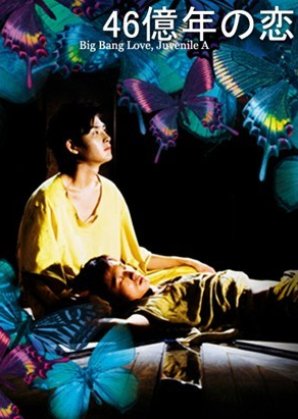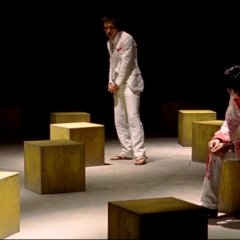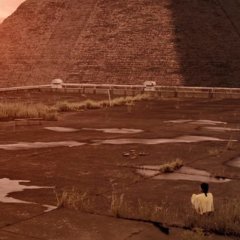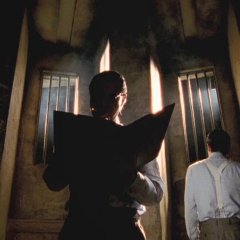- Português (Brasil)
- English
- magyar / magyar nyelv
- dansk
- Título original: 46億年の恋
- Também conhecido como: Big Bang Love, Juvenile A , 46-okunen no koi
- Diretor: Miike Takashi
- Gêneros: Thriller, Mistério, Drama, Fantasia
Elenco e Créditos
- Matsuda Ryuhei Papel Principal
- Ando Masanobu Papel Principal
- Kubozuka ShunsukeYukimura SumioPapel Secundário
- Shibukawa KiyohikoTsuchiya MakotoPapel Secundário
- Kanamori Jo[Hero]Papel Secundário
- Endo Kenichi[Assistant inspector]Papel Secundário
Resenhas

The story is set in a prison with a murder/suicide investigation its focus. It focuses on the two main characters Jun the potential murderer and Shiro, the victim, their background and possible relationship, and the mistery surrounding the case.The whole movie is constructed as a theatre play with stage sets and loaded symbolism. As such, it is rather trippy in parts with pyramids and rackets appearing in the middle of the prison representing where the main characters would like to go after death (outer space with the racket or ascending to heaven on the stairs of the pyramid), or prison cells being just numbered squares drawn on floor with chalk.
I found the story really interesting and engaging to watch to the end with surprising and funny moments as well. Especially memorable was the old sensei telling the young Jun to go and give a blowjow to the miserious tattoed stranger as coming of age ritual at the very beginning of the movie.
I give the acting a 9, extra points to the prison ward. Minus 1 to some of supporting actors, but overall great.
The music is sparse, it only there when it serves a purpose like a dance sequence, otherwise mainly just a church bell here and there.
Esta resenha foi útil para você?
Recomendações
There have been no recommendations submitted. Be the first and add one.

















































